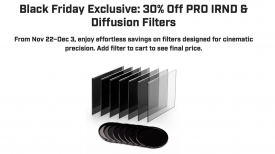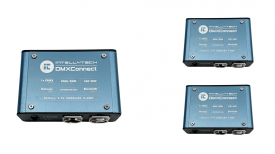
DJI has announced its RS 4 and RS 4 Pro gimbals, as well as the Focus Pro. The RS 4 and RS 4 Pro both feature upgrades over their predecessors, including a new vertical capture mode, improved stabilization, and an upgraded accessory ecosystem
Focus Pro, is DJI’s first independent lens control system with LiDAR autofocus technology. The Focus Pro offers FIZ (focus/iris/zoom) control for both the gimbal and control over select camera functionality as well.
The RS 3 and RS 3 Pro were announced in June 2022. Both gimbals have been extremely popular, but they were arguably due for a refresh.
RS 4
The DJI RS 4, features second-generation native vertical shooting with a redesigned gimbal horizontal plate for seamless transitions to vertical shooting, enhancing efficiency in video creation. The upgraded automated axis locks enable quick start-up, transitions, and storage with minimized gimbal shakes. With a Teflon coating on all three axes, the RS 4 is said to offer smoother balancing, while a fine-tuning knob allows precise adjustments when switching cameras or lenses. Further, an automatic screen lock feature on the OLED touchscreen prevents accidental touches and conserves battery power.

With Bluetooth wireless control, the RS 4 enables remote camera shutter and lens zoom control using Dual-Mode Bluetooth technology, pairing with cameras for reconnection. When paired with the DJI Focus Pro Motor, it allows focus and lens zoom adjustments, enhancing lens control at a motor speed that is claimed to be 30% faster.
The new Joystick Mode Switch allows quick switching between joystick modes for zoom or gimbal control. The customizable trigger function offers FPV mode for dynamic shooting perspectives, while the gimbal mode switch facilitates quick toggling between various modes to adapt to diverse shooting requirements. Additionally, it includes intelligent features such as Motionlapse, Track, and Panorama, empowering creators with versatile shooting capabilities.

The DJI RS 4 features an RSA communication port for enhanced connectivity with accessories like the DJI RS Tethered Control Handle and third-party options, allowing flexible shooting setups tailored to creative needs.
With the DJI RS SDK protocol, third-party developers can customize functions for the RS 4, expanding its versatility for diverse shooting requirements. Additionally, the RS 4 is compatible with the new BG70 High-Capacity Battery Grip, extending runtime to 29.5 hours, with a 2.5 hour charge time, and supporting power delivery to cameras and accessories via USB-C. For integrated shooting experiences, the RS 4 supports the DJI Ronin Image Transmitter, offering high-definition live feeds and remote-control capabilities. Complemented by an extensive accessory ecosystem, including the RS BG30 Battery Grip and RS Focus Motor, the RS 4 empowers cinematographers with advanced functionality and seamless integration for solo and small crew productions.
RS 4 Pro

Thanks to a carbon fiber design, DJI RS 4 Pro provides an impressive 4.5kg (10lbs) payload capacity, ideal for mainstream mirrorless and cinema camera setups. Offering Teflon coating with dual rolling bearings on the roll axis and a tilt axis fine-tuning knob, the RS 4 Pro ensures smooth, precise, and millimeter-level adjustments.
Enhanced features also include second-generation native vertical shooting capability, an auto-lock OLED touchscreen, and improved axis locks for reduced gimbal shakes.
With a 20% increase in motor torque across all axes for enhanced power redundancy, RS 4 Pro ensures precise and responsive tracking even with heavy cameras and accessories.
With the addition of Car Mount mode, the stabilizer optimizes its algorithm for vehicle shoots for steady capture in shaky conditions. Coupled with the fourth-generation RS stabilization algorithm, the RS 4 Pro strikes a balance between strength and tactile feel.

Leveraging the DJI Focus Pro LiDAR Autofocus system, including the Focus Pro LiDAR and Focus Pro Motor with an impressive 76,800 ranging points, a leap of 77%, the RS 4 Pro sharpens human subject edge detection while effectively reducing focus hunting. The gimbal also offers a maximum human subject focusing distance of 20m, approximately three times that of the previous generation. Additionally, the Next-Gen ActiveTrack Pro utilizes advanced AI algorithms and LiDAR technology to ensure steadfast subject tracking, even in challenging conditions. Dual Focus & Zoom Motors, combined with the DJI Focus Pro Motor, provide native and precise lens control.
The remote-control system enables seamless collaborative shooting, allowing for remote gimbal operation and intelligent focus assistance. In collaborative team shooting, the gimbal operator can control the RS 4 Pro gimbal through devices such as the DJI Master Wheels, DJI Ronin 4D Hand Grips, and DJI High-Bright Remote Monitor. Meanwhile, the focus puller can enable LiDAR Waveform on the High-Bright Remote Monitor for intelligent focus assistance, precisely controlling focus using the Focus Pro Hand Unit.
Extended Battery Runtime

The DJI RS BG70 High-Capacity Battery Grip elevates the performance of the RS 4 Pro with an extended battery runtime of up to 29 hours. Equipped with PD fast charging capability, it can reach a rapid full charge in just 2.5 hours, ensuring uninterrupted filming sessions. Additionally, the grip supports powering cameras and accessories with up to 18 watts via the USB-C port, offering exceptional versatility and convenience for prolonged shoots.
Enhanced Ecosystem
The DJI RS 4 Pro seamlessly integrates with the DJI Focus Pro lens control system, cinematographers gain access to comprehensive control over focus, iris, and zoom. With DJI Focus Pro LiDAR to DJI Transmission Cable Hub, seamless integrated setting and power supply could be achieved. DJI RS 4 Pro can power the Focus Pro LiDAR and DJI Video Transmitter simultaneously.
The RS 4 Pro also supports various handheld configurations and professional solutions through the DJI RS SDK protocol, enabling innovative solutions for car mounts, jibs, Steadicams, cable cams, and sliders.
LiDAR Focusing
The all-new DJI Focus Pro Grip offers versatility with a 2.5-hour system power supply, intuitive visual operations, auto-calibration, and data storage for 15 lenses, and Bluetooth connectivity for seamless start/stop recording. Equipped with a full-color touchscreen, the Grip allows operators to adjust LiDAR and motor parameters while providing a real-time view from the LiDAR’s perspective.

With advanced features like an extended human-subject focus distance of 20 meters, approximately three times that of the previous generation, and a super-wide focus field of view of 70°, the LiDAR system offers more accurate and stable focusing capabilities with broader coverage. Boasting 76,800 ranging points and a refresh rate of 30 Hz, the upgraded LiDAR enhances human-subject edge detection while minimizing focus hunting, ensuring reliable focus even in fast-moving scenarios. Focus Pro’s enhanced intelligent autofocus functionalities, including AF subject recognition and tracking, adjustable focus speed, and selectable focus area modes, provide users with easier control over focusing, catering to diverse shooting scenarios. The modular design of the Focus Pro system, comprising LiDAR, Motor, Grip, and Hand Unit modules, offers flexibility to both solo projects and more advanced productions, empowering diverse users to achieve focusing freedom in various shooting scenarios.
AMF, Human-Machine Collaboration
AMF mode, available in both the Hand Unit and Grip is setting a new standard for human-machine collaboration. With AMF focus transition and AMF focus lock, it provides tactile feedback and millisecond-level switching between manual and auto focus, catering to diverse creative demands and ensuring seamless integration of technology and human intuition.
FIZ Lens Control

Featuring stepless real-time damping coefficient adjustments and electronic A-B point marking mode, the Focus Pro Hand Unit ensures precision and convenience in focus control while offering a communication distance of 160m. Enabled with Bluetooth start/stop recording, it facilitates wireless control with mirrorless cameras. The accompanying FIZ Motor delivers significantly improved performance, boasting a 30% faster motor speed, 10ms low latency, and three-level adjustable torque, ensuring smoother operation and versatile cinematic language opportunities. Compatible with 15mm rods, the motor offers more mounting options. The Magnetic Damping Grip complements the unit, allowing seamless transition between focus and zoom control, with adjustable damping feedback for enhanced tactile experience. With intuitive dial operation and customizable rotational ranges, cinematographers can achieve dynamic lens operations effortlessly.
Price & Availability

The DJI RS 4 starts at $549 USD. The RS 4 Pro starts at $869 USD.

There is also a RS 4 Pro Combo kit for $1,099 USD and a RS 4 Combo kit for $719 USD.

The DJI Focus Pro All-In-One Combo is $1,814 USD, and the DJI Focus Pro Creator Combo is $999 USD.





